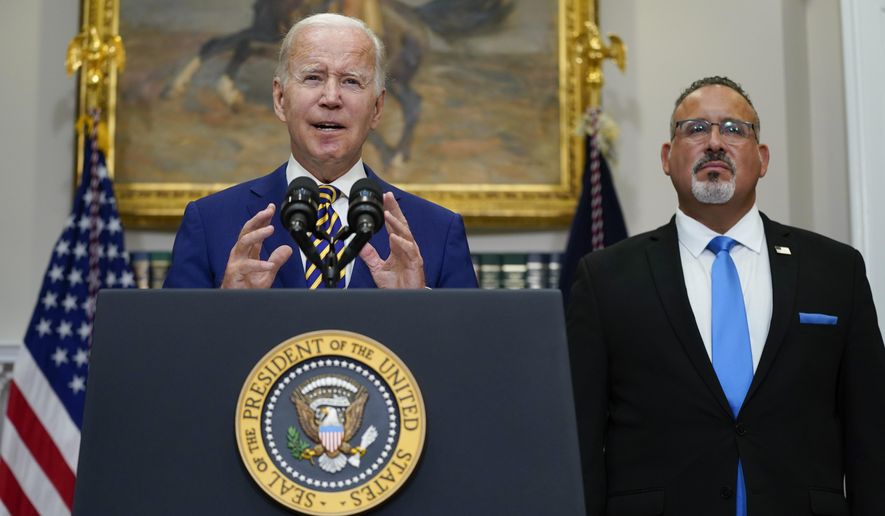A majority of Americans say they are less likely to vote for candidates who support President Biden’s student loan bailout, a new poll shows.
In a nationwide survey by the Trafalgar Group and Convention of States Action published Monday, 55.6% of likely general election voters say they are either “much less likely” or “somewhat less likely” to vote for candidates who support the bailout. Of those, 49% of respondents say the candidates supporting the action are “much less likely” to receive their vote.
Less than half, 44.4% of respondents, said they are more likely to vote for candidates who support Mr. Biden’s student loan forgiveness. Of those, 30.9% say they are “much more likely” to vote for candidates that support it.
Republicans are far more turned off by the bailout. An overwhelming majority, 88.5% of Republicans polled, say they are less likely to vote for candidates who support Mr. Biden’s debt forgiveness. Few Republicans, 11.6%, say they are more likely to vote for candidates who support the bailout.
Among Democrats, 10.5% say they are less likely to vote for candidates who support Mr. Biden’s student loan forgiveness plan, compared with 89.4% who say they are more likely to vote for candidates who support the measure.
Among third-party and independent voters, 64.6%, say they are less likely to vote for candidates who support Mr. Biden’s student loan forgiveness plan, compared with 35.5% who say they are more likely to vote for candidates who support it.
The survey, which was conducted from Sept. 2 through Sept. 5, polled 1,084 likely general election voters. The poll had a margin of error of 2.9 percentage points.
Mr. Biden announced last month that he would cancel up to $20,000 in debt for borrowers who earn less than $125,000 a year — a move certain to attract attention from young voters as Democrats eye a challenging midterm election cycle.
The president also extended the pause on federal student loan payments through December, saying that restarting payments would help offset the cost of the debt write-off.
He capped monthly payments on outstanding undergraduate loans at 5% of discretionary income, down from the current 10%. It forgives loan balances after 10 years of payments, instead of 20 years, for original loan balances of $12,000 or less.
Administration officials expect as many as 20 million people to have their student debt completely forgiven under the plan.
Mr. Biden faced blowback from both sides of the aisle over the move.
Liberals who pressured Mr. Biden to cancel $50,000 of student debt or more per borrower complained that he didn’t go far enough.
Republicans criticized the move as an extension of out-of-control spending by Mr. Biden and his Democratic allies in Congress. Opponents also fault the plan for discriminating against those who repaid their college loans or received tuition breaks in return for military service or chose not to go to college.
Opponents in both parties argued that student loan cancellation is a form of government spending and that Congress, not the executive branch, controls the purse strings. That issue is expected to fuel court challenges that could derail the debt forgiveness for years, if not indefinitely.
Correction: A previous version of this story inadvertently did not identify both groups involved in the poll. The poll was completed by the Trafalgar Group and Convention of States Action.
• Joseph Clark can be reached at jclark@washingtontimes.com.




Please read our comment policy before commenting.